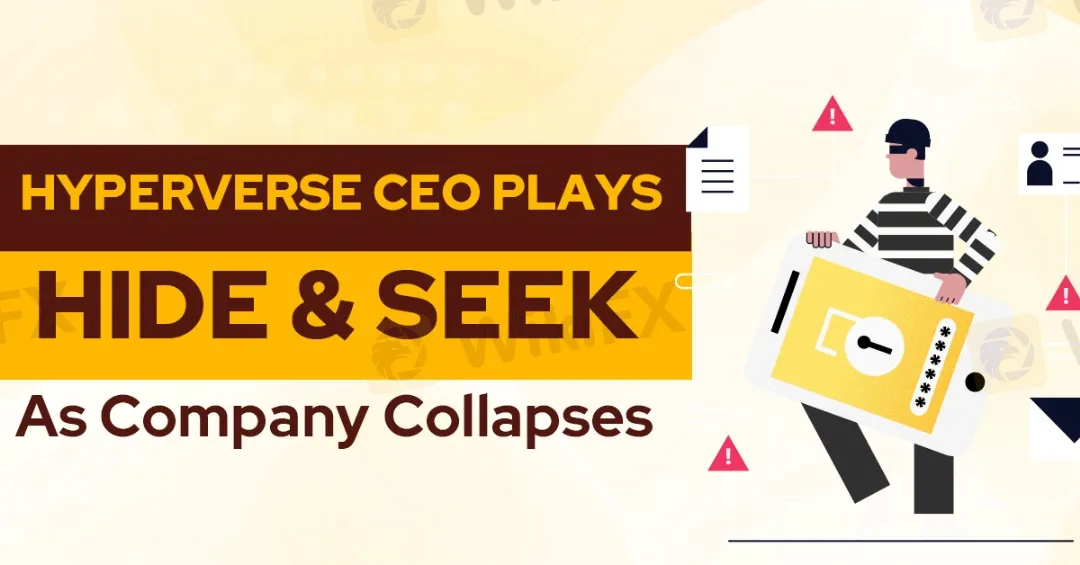简体中文
繁體中文
English
Pусский
日本語
ภาษาไทย
Tiếng Việt
Bahasa Indonesia
Español
हिन्दी
Filippiiniläinen
Français
Deutsch
Português
Türkçe
한국어
العربية
HYPERVERSE CEO Plays Hide & Seek As Company Collapses
Abstract:Unraveling the HyperVerse saga: amidst company collapse, the CEO vanishes, leaving questions in the wake of Blockchain Global's downfall, celebrity endorsements, and regulatory scrutiny.

The collapse of the bitcoin company Blockchain Global, led by Australian entrepreneur Sam Lee and his partner Ryan Xu, birthed HyperVerse, now under international scrutiny for its alleged pyramid scheme structure.
At the core of the controversy lies Steven Reece Lewis, introduced as HyperVerse's CEO during an online launch. Despite touting impressive credentials, an investigation by Guardian Australia unearthed discrepancies and false assertions about Lewis's educational and professional history.
The absence of any records of Steven Reece Lewis at reputable institutions like the University of Leeds and the University of Cambridge, along with a lack of presence in official registries such as Companies House in the UK or SEC filings in the US, raises skepticism. Additionally, major corporations like Adobe and Goldman Sachs have no trace of his employment.
Lewis's online footprint seems confined solely to HyperVerse, marked by a Twitter account initiated just a month before the scheme's launch, which went inactive six months later. Such unverifiable background information casts doubts on his professed qualifications and involvement in HyperVerse.

The scheme's credibility was bolstered by promotional videos featuring endorsements from high-profile figures like Apple co-founder Steve Wozniak, actor Chuck Norris, comedian Jim Norton, and singer Lance Bass. However, these endorsements were likely secured through the paid platform Cameo.
Sam Lee, initially linked to HyperVerse, refutes involvement in the scheme, especially regarding its transition to HyperNation. His precise role in founding and running HyperFund and HyperVerse remains ambiguous, as he has not addressed queries seeking clarification.
Blockchain Global, co-founded by Lee and Xu, faces a $58 million debt to creditors, prompting a regulatory audit by the Australian Securities and Investments Commission (ASIC). Despite concerns raised about HyperVerse, ASIC currently indicates no immediate regulatory action, a decision questioned as the scheme has been flagged by overseas regulators.
HyperVerse, pitched as a revolutionary digital metaverse, aimed to rival Facebook's virtual domain, claiming to transform global interactions and business operations. Promising substantial returns – a minimum of 0.5% daily, totalling a 300% return over 600 days – and offering incentives for member recruitment, HyperVerse adopted common tactics seen in pyramid schemes.
However, despite these enticing assurances, the analysis firm Chainalysis estimated losses to HyperVerse in 2022 at approximately $1.3 billion.

Disclaimer:
The views in this article only represent the author's personal views, and do not constitute investment advice on this platform. This platform does not guarantee the accuracy, completeness and timeliness of the information in the article, and will not be liable for any loss caused by the use of or reliance on the information in the article.
Read more

Rising WhatsApp Scams Highlight Need for Stronger User Protections
UK consumers lose £2,437 on average to WhatsApp scams. Revolut demands stricter verification and AI monitoring to combat rising fraud on Meta platforms.

Georgia Man Charged in Danbury Kidnapping and Crypto Extortion Plot
Georgia man James Schwab charged in Danbury kidnapping tied to $230M crypto heist. Plot targeted couple for ransom after Miami altercation with son.

Bybit Shuts Down NFT Marketplace Amid Crypto Market Downturn
Bybit announces the closure of its NFT marketplace, citing efforts to streamline offerings. Discover the latest trends in the declining NFT market and its shift to utility-based growth.

Galaxy Digital Settles $200M in Luna Token Manipulation Case
Galaxy Digital pays $200M to settle Luna token manipulation probe by NY regulators, linked to TerraUSD’s 2022 crash, impacting crypto market stability.
WikiFX Broker
Latest News
TradingView Brings Live Market Charts to Telegram Users with New Mini App
Trump tariffs: How will India navigate a world on the brink of a trade war?
Interactive Brokers Launches Forecast Contracts in Canada for Market Predictions
Authorities Alert: MAS Impersonation Scam Hits Singapore
Stocks fall again as Trump tariff jitters continue
INFINOX Partners with Acelerador Racing for Porsche Cup Brazil 2025
Regulatory Failures Lead to $150,000 Fine for Thurston Springer
April Forex Trends: EUR/USD, GBP/USD, USD/JPY, AUD/USD, USD/CAD Insights
March Oil Production Declines: How Is the Market Reacting?
Georgia Man Charged in Danbury Kidnapping and Crypto Extortion Plot
Currency Calculator







